
Vladimir Aleksandrovich Shatalov is a former Soviet cosmonaut who flew three space missions of the Soyuz programme: Soyuz 4, Soyuz 8, and Soyuz 10.

Simeon Borisov von Saxe-Coburg-Gotha, known formerly or by courtesy as King Simeon II or Tsar Simeon II, is a Bulgarian politician, who had served as the last reigning Tsar of Bulgaria from 1943 to 1946, before later serving as Prime Minister of Bulgaria from 2001 to 2005.

Aegean Macedonia is a term describing the modern Greek region of Macedonia in Northern Greece. It is currently mainly used in the Republic of North Macedonia, including in the irredentist context of a United Macedonia. The term is also used in Bulgaria as the more common synonym for Greek Macedonia, without the connotations it has in the Republic of North Macedonia. The term has no circulation in Greece, since Aegean usually refers to the Greek islands or to strictly Greek coastal areas with direct access to the Aegean Sea. Although Greek Macedonia does indeed have its coastline along the northern Aegean, the province is more than anything else dominated by its high mountain ranges and broad, grassy plains, rather than by its coastline.
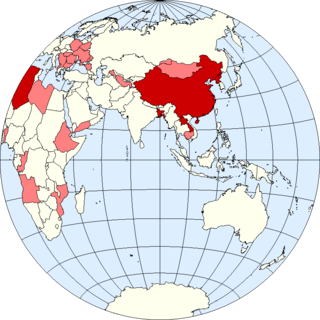
People's republic is an official title used by some currently or formerly communist or left-wing states. It is mainly associated with soviet republics, socialist states following people's democracy, sovereign states with a democratic-republican constitution usually mentioning socialism, or simply a title used by a given country.

The coat of arms of Bulgaria consists of a crowned golden lion rampant over a dark red shield; above the shield is the Bulgarian historical crown. The shield is supported by two crowned golden lions rampant; below the shield there is compartment in the shape of oak twigs and white bands with the national motto "Unity makes strength" inscribed on them.

The Socialist Republic of Macedonia, or SR Macedonia, commonly referred to as Socialist Macedonia or YugoslavMacedonia, was one of the six constituent countries of the post-WWII Socialist Federal Republic of Yugoslavia, and a nation state of the Macedonians. After the transition of the political system to parliamentary democracy in 1990, the Republic changed its official name to Republic of Macedonia in 1991, and with the beginning of the breakup of Yugoslavia, it declared itself an independent country and held a referendum on 8 September 1991 on which a sovereign and independent state of Macedonia, with a right to enter into any alliance with sovereign states of Yugoslavia was approved.
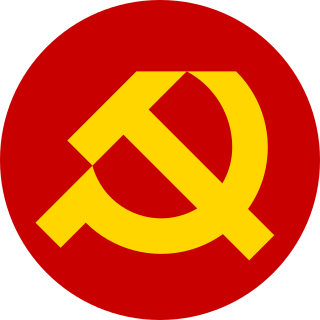
The Bulgarian Communist Party was the Communist and Marxist-Leninist ruling party of the People's Republic of Bulgaria from 1946 until 1989 when the country ceased to be a socialist state. The Bulgarian Communist Party had dominated the Fatherland Front coalition that took power in 1944, late in World War II, after it led a coup against Bulgaria's tsarist regime in conjunction with the Red Army's crossing the border. It controlled its armed forces, the Bulgarian People's Army.
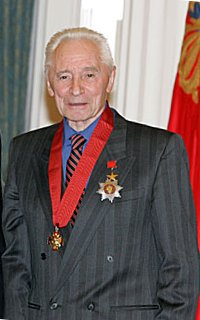
Yury Nikolayevich Grigorovich is a Soviet and Russian dancer and choreographer who dominated the Russian ballet for 30 years.
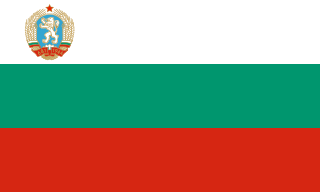
The People's Republic of Bulgaria was the official name of Bulgaria, when it was a socialist republic that existed from 1946 to 1990 ruled by the Bulgarian Communist Party (BCP), which in turn ruled together with its coalition partner, the Bulgarian Agrarian People's Union. Bulgaria was closely allied with the Soviet Union during the Cold War, being part of Comecon as well as a member of the Warsaw Pact. The Bulgarian resistance movement during World War II deposed the Kingdom of Bulgaria administration in the Bulgarian coup d'état of 1944 which ended the country's alliance with the Axis powers and led to the People's Republic in 1946.

Emperor Pedro I of Brazil founded the National Order of the Southern Cross as a Brazilian order of chivalry on 1 December 1822. The order aimed to commemorate the independence of Brazil and the coronation of Pedro I. The name derives from the geographical position of the country, under the constellation of the Southern Cross and also in memory of the name – Terra de Santa Cruz – given to Brazil following its first discovery by Europeans in 1500.
Orders, decorations and medals of Bulgaria are regulated by the law on the Orders and Medals of the Republic Of Bulgaria of 29 May 2003.
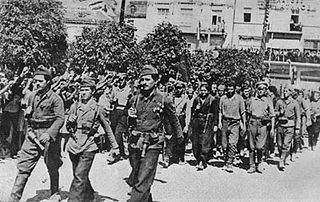
The 1944 Bulgarian coup d'état, also known as the 9 September coup d'état, was the forcible change of the government of Kingdom of Bulgaria carried out on the eve of 9 September 1944. In Communist Bulgaria it was called People's Uprising of 9 September – on the grounds of the broad unrest, and Socialist Revolution – as it was a turning point politically and the beginning of radical reforms towards socialism.
Socialist democracy is a form of democracy. It includes ideologies such as council communism, democratic socialism and social democracy as well as Marxist democracy like the dictatorship of the proletariat. It was embodied in the Soviet system (1917–1991).

Ethnic Macedonians in Bulgaria are a group in Bulgaria concentrated within Blagoevgrad Province and the capital Sofia. According to the Bulgarian Helsinki Committee in 1998, their number ranged from 15,000 to 25,000. In 2006, per the personal evaluation of a leading local ethnic Macedonian activist Stojko Stojkov, they counted already between 5,000 and 10,000 people. The 1992 census indicated 10,830 Macedonians, but in the 2001 census this figure had decreased to 5,071. However in the 2011 Bulgarian census only 1,654 people declared themselves to be ethnic Macedonians. They are not recognised as an ethnic minority but were recognised as such between 1946 and 1958.

OFC Bdin is a Bulgarian football club based in Vidin, currently playing in the North-West Third League, the third level of Bulgarian football. Its home stadium "Georgi Benkovski" has a capacity of 15 000 seats. Club colors are red and white. The club was officially founded in 1923.

Military aircraft insignia are insignia applied to military aircraft to identify the nation or branch of military service to which the aircraft belongs. Many insignia are in the form of a circular roundel or modified roundel; other shapes such as stars, crosses, squares, or triangles are also used.
The Order of Saints Cyril and Methodius is an award conferred by the Republic of Bulgaria.

The National Order of Labour was an Order of Merit of the Kingdom of Bulgaria from 1945 to 1946, and of the People's Republic of Bulgaria from 1946 to 1990. It came in three grades
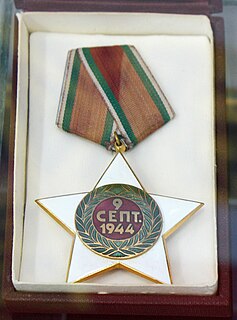
The Order of 9 September 1944 was an Order of Merit of the Kingdom of Bulgaria from 1945 to 1946, and of the People's Republic of Bulgaria from 1946 to 1990. It commemorated the Bulgarian coup d'état of 1944, it came in three classes, had both a civil and military division and was awarded for services connected with the Army revolt of 9 September 1944 and the formation of the People's Republic, to civilians for service to the government and in wartime to officers and leaders of the People's Army for courage and leadership.

The Emblem of the People's Republic of Bulgaria was first used from 1946 until the end of communist rule in 1990. Following the communist coup d’etat was held against the government of King Simeon on 9 September 1944, the insurgents used royal flags defaced by cutting out the crown and the royal cyphers. Around the arms was a garland of branches of oak and olive. On 15 September 1946, the People's Republic was proclaimed. On 6 December 1947 an emblem patterned after the State Emblem of the Soviet Union was adopted that consisted of a red five-pointed star with eight ears of wheat or tied with a ribbon Gules inscribed with the motto: 9 IX 1944.

















